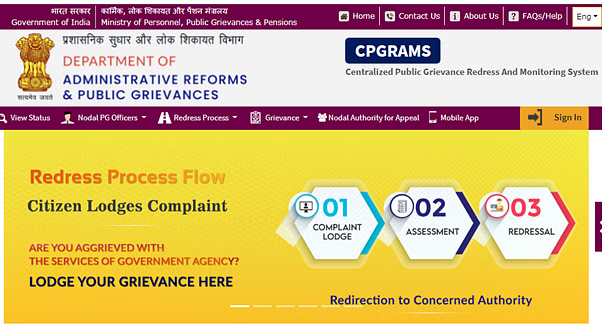Central Government Reduces Time for Public Complaint Resolution to 30 Days, Secretaries to Engage Directly with Complainants
New directive mandates quicker grievance redressal, introduces citizen feedback mechanisms, and empowers grievance officers to enhance transparency and accountability.

The Central Government has announced a significant change in the resolution process for public complaints. The time allowed for resolving complaints on the dedicated online portal has been reduced from 45 days to a maximum of 30 days. In a move aimed at enhancing accountability and transparency, the government has also mandated that a complaint will not be considered closed until any appeal against it has been fully addressed.
Appeals Process and Complaint Closure
The Department of Administrative Reforms and Public Grievances (DARPG) issued an order stating that a complaint will be considered closed only after the disposal of any appeal lodged by the complainant. The DARPG, under the Union Ministry of Personnel, Public Grievances and Pensions, emphasized the importance of ensuring that citizens’ voices are heard and that they have confidence in the grievance redressal system.
The order states, “Complaints received on the Centralized Public Grievance Redress and Monitoring System (CPGRAMS) will be resolved immediately upon receipt, but in no case later than 30 days. If resolution within this timeframe is not possible due to issues such as ongoing litigation or policy matters, an interim or appropriate response will be provided to the citizen.”
Volume of Complaints
From January to March this year, a total of 13,32,567 complaints were received, out of which 4,18,451 were resolved. In 2021, 30,23,894 complaints were received, of which 21,35,923 were resolved. The previous year, 33,42,873 complaints were lodged, with 23,19,569 being resolved. In 2019, 27,11,455 complaints were registered, with 16,39,852 resolved.
Last year, the DARPG had reduced the maximum time limit for resolving public grievances from 60 days to 45 days.
Role of Grievance Redressal Officers
The latest directive from the DARPG requires all government departments to appoint Nodal Grievance Redressal Officers (GROs) and ensure they are adequately empowered to address public grievances. Departments can appoint as many GROs as necessary, depending on the volume of complaints received, under the supervision of the Nodal Grievance Redressal Officer.
The July 27 order states, “The Grievance Redressal Officers will be responsible for resolving grievances on an urgent basis and as a priority.” Once a complaint is closed, citizens have the option to provide feedback and file an appeal. An outbound call center has been established to gather feedback on the quality of grievance redressal.
Citizen Feedback and Monitoring
The order also mentions that all citizens who file complaints will be contacted by the call center to obtain feedback. If a citizen is dissatisfied with the resolution, they will have the option to file an appeal. The feedback collected from citizens will be shared with the respective ministries or departments, which will be responsible for addressing the feedback and implementing “systemic improvements.”
To institutionalize the grievance redressal mechanism and ensure quality resolutions, the secretaries of ministries or departments may review the process in senior officials’ meetings. If deemed necessary, secretaries may personally call citizens to gather feedback on the resolution process.
Furthermore, ministries and departments have been asked to monitor complaints raised in print and electronic media. They are also encouraged to regularly analyze complaint trends and conduct a ‘root cause analysis’ to identify and address underlying issues. Based on this analysis, ministries and departments may implement remedial measures.
To ensure the effective functioning of CPGRAMS and satisfactory resolution of citizens’ grievances, all ministries and departments are required to review, streamline, and strengthen their internal redressal mechanisms. The DARPG will also organize training programs in collaboration with the Institute of Secretarial Training and Management (ISTM) to support this effort.
This summarizes the new initiatives by the Central Government to improve the grievance redressal process and ensure a more citizen-friendly approach.





